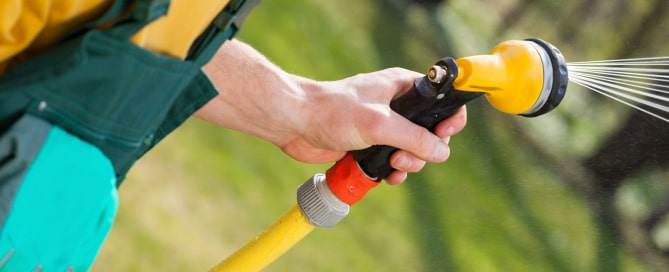As summer approaches, it’s up to us to protect the trees on our property. Trees that are exposed to extreme heat and dry conditions during the summer can be stressed and more prone to health issues the following winter.
Young trees, especially, need extra care and diligent watering in hot, dry weather. Older, more established trees may not require extra watering, but there are steps you can take to ensure the tree and root system remains healthy.
Summer Watering Tips
Be Consistent.
Follow a regular, consistent watering schedule that mimics natural rainfall. Give each tree one gallon of water (the equivalent to one inch of rain) every week or so.
Take Extra Care.
For newly planted or young trees, water more frequently during hot, dry weather. They are still establishing their root systems and need extra care during drought, otherwise they will become stressed.
Choose the Right Time.
Avoid watering trees during the afternoon, when evaporation is at its peak. The best time to water is early in the morning, before the heat of the day.
Water Deep.
Deep watering is the best kind of watering. If possible, install a drip system and bury it at least a feet below the ground.
Don’t Underestimate the Power of Mulch.
Keep trees well mulched (2-4 inches) to retain moisture and regulate the soil temperature. If you have a drip system, make sure to apply mulch beyond the drip line for maximum water uptake. Read how to properly apply mulch to your trees here.
Keep Your Trees Happy Year-Round.
Keeping trees happy and healthy throughout the year goes a long way toward keeping them protected during the harsh summer months. Fertilize regularly and apply compost to the soil twice a year to improve the soil structure and reduce water runoff.
How to be Firewise
Going into the summer season, there has been a flurry of news articles highlighting wildfire danger in New Jersey’s Pinelands, with Rolling Stone Magazine going so far as to report headlines like “Apocalypse in the Garden State.”
Since the last major blaze in 1963 – known as Black Saturday – the population in the Pinelands has tripled. According to the article, “If a series of blazes starts on the right dry and windy day, it could take out a large chunk of the Jersey coastline.”
Although most city dwellers don’t think much about wildfire danger, the 720% population increase in wildland/urban interface areas across the U.S. (since 1960) has put more homes and lives in jeopardy than ever before. Because embers from wildfires can travel up to 14 miles, home ignitions can happen anywhere.
What Does That Mean for New Jersey Homeowners?
According to the National Fire Protection Association (NFPA), “When it comes to wildfire risk, it is not a geographical location, but a set of conditions that determine the home’s ignition potential in any community.”
There are simple, proven steps you can take to protect your home or property from fire, like:
- Pruning trees on the property so that the lowest branches are no lower than 6 feet from the ground
- Keeping grass, trees and shrubs on the property well watered and maintained
- Clearing leaves and dead vegetation from gutters, porches, and decks within 10 feet from the home or building
- Removing flammable items like firewood and propane tanks within 30 feet from the home or building
For more tips on how to protect your home, download NFPA’s Firewise Toolkit.
If you need help getting your trees ready for summer, give us a call. The tree care experts at Friendly Tree are here to provide skilled, reliable service, taking the utmost care of our customers and their trees.



Recent Comments